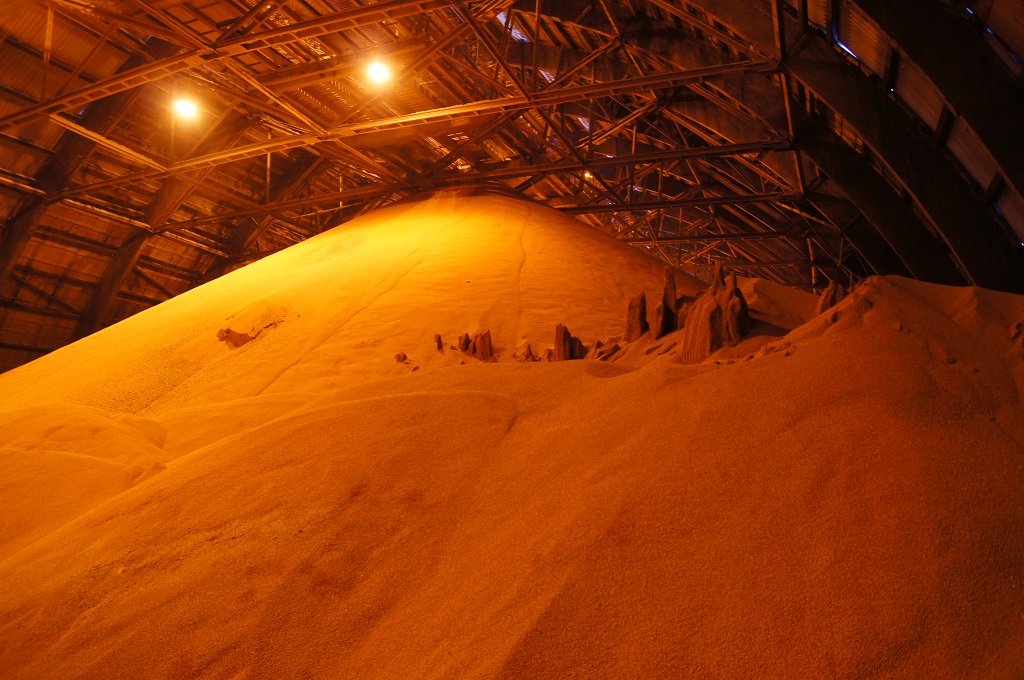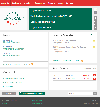Uralkali Announces 3Q and 9M 2015 Key Figures, Operations and Market Update

Uralkali (LSE: URKA, “the Company”), one of the world’s largest potash producers, announces its unaudited IFRS key figures for the third quarter and nine months ended 30 September 2015.
3Q 2015 top line and operational highlights:
- Production down 6% y-o-y to 3.0 million tonnes of potassium chloride (KCl)
- Sales volumes down 6% y-o-y to 2.9 million tonnes of KCl
- Revenue down 9% y-o-y to US$ 819 million
- Net revenue1 down 2% y-o-y to US$ 702 million
9M 2015 top line and operational highlights:
- Production down 5% y-o-y to 8.7 million tonnes of potassium chloride (KCl)
- Sales volumes down 8% y-o-y to 8.5 million tonnes of KCl
- Revenue down 9% y-o-y to US$ 2,381 million
- Net revenue down 1% y-o-y to US$ 2,011 million
- Cash COGS at US$ 32 per tonne
- Average FCA export price up 11% y-o-y to US$ 248 per tonne of KCl
3Q 2015 corporate highlights:
- In August, the Moscow Exchange registered Uralkali’s Exchange Traded Bonds Programme of up to RUB 100 billion
- In August, Uralkali entered into an agreement to acquire 20,358,852 shares of an additional issuance of JSC Uralkali-Technology (a wholly-owned subsidiary of the Company) for a total amount of approximately RUB 145 billion, which was approved on 7 August 2015 by an Extraordinary General Shareholders Meeting of the Company
- In August-September, Uralkali executed a tender offer for its shares and GDRs, purchasing 21.98% of Uralkali’s outstanding common shares and GDRs for a total amount of US$ 2.06 billion
- In September, Uralkali and PJSC Sberbank (Sberbank) signed an agreement to open a non-revolving US$ 1.5 billion credit line with 5 year maturity period.
- In September, JSC Uralkali-Technology (“Uralkali-Technology”, a wholly-owned subsidiary of the Company), has signed a master agreement and confirmation with JSC VTB Capital with respect to a REPO transaction. As a result of the entry into the REPO transaction Uralkali-Technology has obtained financing for a total amount of US$ 800 million, after transferring 370,123,777 common shares of PJSC Uralkali under the REPO agreement, which constitutes 12.6% of the Company’s share capital. Uralkali-Technology has also signed a pledge agreement with JSC VTB Capital for the global depositary receipts (GDRs) representing shares of the Company, which secures Uralkali-Technology obligations under the REPO agreement, and pledged 43,335,594 GDRs, which corresponds to 216,677,970 ordinary shares and constitutes 7.38% of the Company’s share capital, to JSC VTB Capital.
Key 3Q and 9M figures are as follows:
| 3Q 2015 | 3Q 2014 | 9M 2015 | 9M 2014 | |
| Revenue (US$ million) | 819 | 896 | 2,381 | 2,622 |
| Net revenue (US$ million) | 702 | 715 | 2,011 | 2,031 |
| Production (KCl, million tonnes) | 3.0 | 3.2 | 8.7 | 9.2 |
| Sales volume (KCl, million tonnes) | ||||
| TOTAL | 2.9 | 3.1 | 8.5 | 9.2 |
| — Export | 2.3 | 2.6 | 6.9 | 7.7 |
| — Domestic | 0.6 | 0.5 | 1.6 | 1.5 |
Dmitry Osipov, Uralkali CEO, commented:
Uralkali’s financial results in the third quarter accurately reflect the situation in the global potash market. In light of current market conditions, the Company may yet review its production and sales plans.
Financial and business review
Weakened demand in key markets has affected both production volumes and sales in 3Q 2015, which led to a decrease in revenue by 9%. Total revenue for the first 9 months of 2015 also decreased by 9% and amounted to US$ 2,381 million. Cash COGS decreased to US$ 32 per tonne, mainly due to the devaluation of the Russian rouble.
At the end of September 2015, the effective interest rate for the credit portfolio was about 4%. Net debt rose to US$ 5,070 million.
In the first 9 months of 2015, the Company produced 8.7 million tonnes of KCl, down 5% y-o-y.
In the same period, Uralkali continued to implement its capacity development programme. Shaft sinking continued at the Ust-Yayva mine and the construction of ground-level infrastructure has also started. Other projects are also being implemented in line with the approved schedule.
Market Review and Outlook
In the third quarter, market sentiment was negatively impacted by macroeconomic challenges in some regions and high potash price volatility, as well as government policies. The spot markets were quiet and trade into major markets lagged behind normal levels for this time of year. The combination of weaker year-on-year potash demand and customer destocking weighed negatively on potash prices.
In India, a weak monsoon season and the depreciation of the Indian rupee against the US dollar led to cautiousness among farmers. In the 2015/2016 fiscal year until September 2015, India imported 2.1 million tonnes of potash, down from 2.4 million tonnes in the same period of the previous fiscal year. We expect India to import
Shipments to China have been relatively strong this year. In the first nine months, potash imports reached 6.1 million tonnes, up 9% on last year. However, the introduction of 13% VAT, low oilseed and cereal prices and slowing economic growth may limit potash demand upside for the rest of the year.
Southeast Asian markets experienced little activity during the most of the third quarter. Concerns about the respective currency devaluations in Indonesia and Malaysia limited import demand. The region is expected to import
Markets in Latin America were negatively affected by weaker national currencies against the US dollar and negative sentiment regarding crop prices. Buying activity in Brazil remained relatively weak during the third quarter, which usually sees strong demand. Difficulties in obtaining financing meant that Brazilian farmers preferred to purchase according to their immediate needs. In January-September this year, Brazil imported 6.3 million tonnes of potash, down 10% year-on-year. We expect potash demand in Latin America to fall to
The North American market remained seasonally slow during most of third quarter of 2015. In October, potash sales picked up and demand proved to be better than expected during the summer. However, demand is expected to decline by
The European market was also seasonally slow in the third quarter. High grain stocks in European warehouses and weaker year-on-year grain prices limited buying activity. EMEA demand is expected to fall to
Potash deliveries to the domestic market in the third quarter of 2015 grew by 10% year-on-year due to growth in consumption by NPK manufacturers. Consumption by agricultural producers decreased year-on-year due to difficulties in attracting external financing, as well as higher costs for the purchase of imported seeds, plant protection products and agricultural machinery. Shipments of potash to oil service companies remained unchanged from levels during the third quarter last year. The drilling and exploration plans for new deposits by oil and gas companies until the end of 2015 also remain unchanged. This will have a positive impact on demand for potash in this market segment.
Given record deliveries in 2014 which created significant end-year potash stocks, continued macroeconomic volatility in some markets throughout 2015 and the lower crop price environment in many regions of the world, we expect global potash deliveries to total 58 million tonnes in 2015, which will represent an 8% decrease from the record levels in 2014.
Uralkali (www.uralkali.com) is one of the world’s largest potash producers and exporters. The Company’s assets consist of 5 mines and 7 ore-treatment mills situated in the towns of Berezniki and Solikamsk (Perm Region, Russia). Uralkali employs ca.11,000 people (in the main production unit). Uralkali’s shares and GDRs are traded on the Moscow Exchange and London Stock Exchange, respectively.
1 Net revenue represents adjusted revenue (sales net of freight, railway tariff and transshipment cost)


